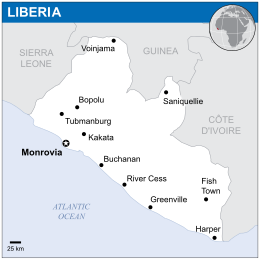More languages
More actions
General-KJ (talk | contribs) m (Added category) Tag: Visual edit |
mNo edit summary Tag: Visual edit |
||
| Line 14: | Line 14: | ||
== References == | == References == | ||
[[Category:African countries]] | [[Category:African countries]] | ||
[[Category: | <references /> | ||
[[Category:Neocolonial outposts]] | |||
[[Category:Former settler-colonial states]] | |||
{{DEFAULTSORT:Liberia}} | |||
Revision as of 16:36, 27 December 2024
| Republic of Liberia | |
|---|---|
 | |
| Capital and largest city | Monrovia |
| Official languages | English |
| Dominant mode of production | Capitalism |
| Government | Unitary presidential constitutional republic |
• President | George Weah |
| Area | |
• Total | 43,000 km² |
| Population | |
• 2022 estimate | 5,358,483 |
Liberia, officially the Republic of Liberia, is a country in West Africa and former U.S. colony.
History
Colonization
Eli Ayers of the American Colonization Society took control of Cape Mesurado in May 1822. Six months later, several African nations united and fought against the colonizers but were defeated. In July 1847, Liberia declared independence as a U.S. neocolony.[1]
Neocolonial period
After so-called independence, the ruling settler elite continued to oppress native Africans. Indigenous Africans could not be citizens until 1904.
Under the rule of William Tubman, Liberia held the largest CIA base in Africa and supported the USA's fight against socialist, pan-African, and national liberation movements. William Tolbert, the only anti-colonial president in Liberian history, took power in 1972, was a follower of Nkrumah, Touré, and Cabral. He broke relations with Israel in 1973 while establishing relations with Cuba and the USSR. Samuel Doe murdered Tolbert in 1980 and took power as a U.S. puppet.[1]
References
- ↑ 1.0 1.1 Djibo Sobukwe (2023-04-26). "Liberia and the Challenges of US Imperialism" Black Agenda Report. Archived from the original on 2023-04-26. Retrieved 2023-05-06.


